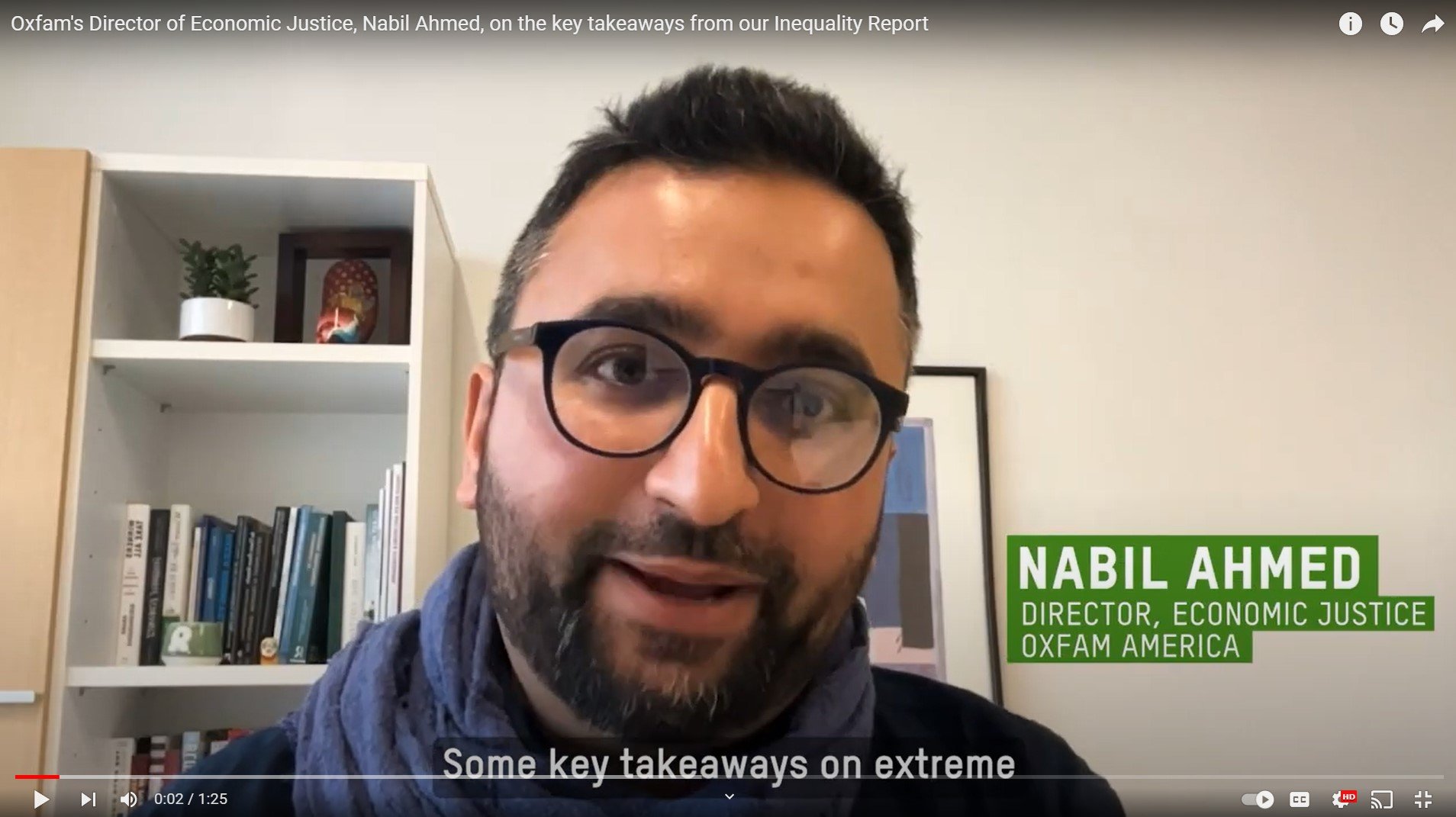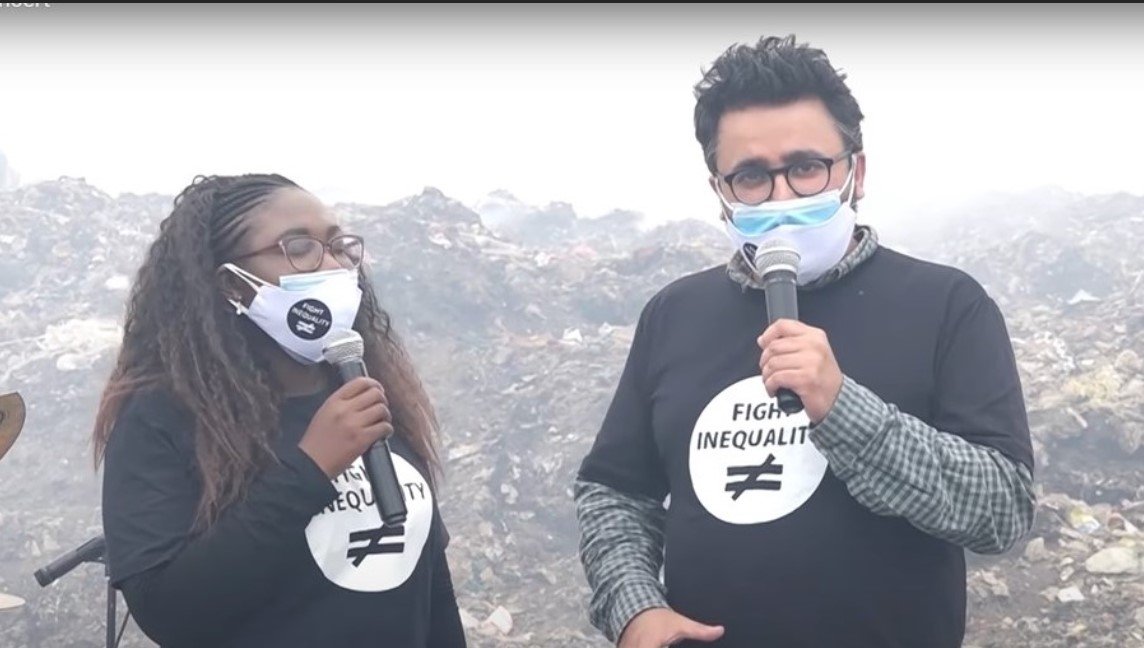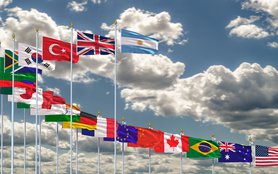In the first of a series of interviews with some of Oxfam's experts and advocates, Nabil Ahmed ponders on the current state of inequality: how it stands, how we got here, and how to redress the balance of power.
Mary Babic: Nabil, congratulations on this year’s inequality report from team Oxfam (Survival of the Richest). The report, which dropped ahead of the annual convening of the World Economic Forum in Davos, Switzerland, generated a nice splash of attention, as well as outrage.
Sadly, though, the headline every year is similar: inequality is even more extreme! Now! than it was last year! This time, we’re dismayed to point out that BOTH extreme wealth and extreme poverty have increased for the first time in 25 years; the long decline in extreme poverty is over, and nearly a billion people are facing hunger and food insecurity every day.
In light of this grim news, some questions for you.
To begin, then, how did we get here? Which is to say, what are the winds behind the sails of the uber wealthy’s super yachts? How have the very wealthy and corporations hijacked our economy? Why has it gotten so much more extreme in the wake of the pandemic?
Nabil Ahmed: The starting point is recognizing that we arrived here not by accident but by economic and political choices that were made by our governments that widened the great divide of economic inequality.
These were already in full swing prior to the pandemic. For decades we’ve seen structural policy shifts that have increased inequality—from a surge in monopoly power to the erosion of workers’ rights and labor market liberalization to the privatization of public goods like health and education to the erosion of tax rates on the richest people and corporations.
Since 1995, for example, the top one percent has grabbed nearly 20 times more wealth than humanity’s bottom 50 percent This era has grown the wealth and the power of those at the very top and not so much left but actually pushed so many behind – and in doing so, made us all less safe, and less resilient to massive shocks.
Mary Babic: Now, enter a deadly pandemic into this mix. What happens?
Nabil Ahmed: First, we’ve seen those longer-term trends supercharged. The IMF, for example, warned about market concentration growing during the pandemic as much as it did from 2000 to 2015. Oxfam data showed that during the pandemic, a time when the public purse was starved, 95 percent of countries did not increase taxes on rich people and corporations; some even lowered them.
Second, mostly in rich countries, we saw trillions of dollars injected into financial markets to prevent their collapse. That was, yes, essential to keep economies afloat. But so much of this fresh cash ended up lining the pockets of those who were already extremely wealthy. This was on the back of a stock market boom – and the economic guardrails that would allow for that wealth to be shared more equitably simply didn’t exist.
And thirdly, while there are a bunch of factors, let’s zoom in on the role of corporate behavior. We’ve seen through these last few years a smash-and-grab for profit that’s driven up inequality while exacerbating and exploiting inflation. We saw during the pandemic, for example, how some of the top pharma corporations, which were fiercely monopolizing control of publicly funded COVID-19 vaccines, were able to make $1,000 in profit a second. Our new data shows 95 food and energy corporations more than doubled their profits in 2022–at a time when people worldwide are struggling to put food on the table.
Taking this range of factors together, that’s got us to a world in which the one percent captured two-thirds of all new wealth created at the start of the decade. That means they’ve got double the wealth of the rest of humanity, the 99 percent of us, put together.
The one percent have really outdone themselves: in the previous decade they captured half of all new wealth, which already was extraordinary by historical comparisons.

Mary Babic: So, how do we reverse course? Since the first edition, we’ve been saying quite clearly: Tax the Rich. But how do we make this happen? And is that enough? For example, taxation won’t raise wages in the US; as long as the Senate is beholden to corporate forces, it will stonewall an increase in the federal minimum wage, which I have to say (again!) has been stuck at $7.25 for nearly 14 years.
Nabil Ahmed: The most important point here is that we can reverse course: it’s a policy and political choice. It’s really up to governments to make the right choices.
And we must push our policy makers, across the political spectrum, to act. That is why we talk about policy and political choices. It’s why movements build power alongside making the policy case. After listening to a group of advocates who sought his support, President Franklin D. Roosevelt famously said, “You've convinced me. Now go out and make me do it.”
That’s where we come in—winning the policy argument is crucial but it’s only one part of the process. Making them do it is necessary.
So what policies are we talking about? It’s taxing the ultrawealthy, sure, and a range of actions—proven by evidence, by history and by the practice of nations—can rein in extreme inequality. To name a few, it includes strengthening worker power and addressing corporate monopolies. It includes investment in public goods of healthcare, and education—which are rights for all, not luxuries for only the rich to enjoy.
As we’re saying this year, a strategic precondition to reining in extreme inequality is taxing the ultrarich and corporations. It’s mind-boggling that billionaires pay a lower tax rate than day-care workers and teachers.
Practically, that includes one-off solidarity wealth taxes and windfall taxes to end the kind of crisis profiteering that we’ve seen this pandemic. It includes permanent increases in taxes on the very richest one percent and above (these aren’t teachers and nurses and the middle-class but those at the very top) and it includes raising taxes on capital gains. And it includes permanent taxes, alongside income, on the extreme wealth of the very richest.
We know wealth is more pronounced than income inequality, and we can act strategically here in implementing sensible taxes on inheritance, property and land, as well as net wealth taxes, in a way that significantly addresses inequality. The wealth tax proposal, designed by leading economists and proposed by Senator Warren, is one example of how we can go about that.
Part of our job here is reckoning with a narrative that tells us it’s somehow extreme to tax the richest. Surely, the extreme thing to do is to live in a world of such extreme inequalities? In which 81 billionaires own more wealth than does half of humanity, or in which 140 million people are poor and low income in the richest country in the history of the world, or in which we allow democracy to be undermined by elite wealth.
I find inspiration in history. The last time things got so unequal, FDR rewrote the rules of the American economy. In the wake of World War II, he went to Congress urging a 100 percent rate on income earned above what would be $1 million today. They settled on 94 percent.
That approach continued under both parties, and it averaged 81 percent until 1981. In that period, while far from ideal especially along racial lines, we saw the US grow its middle class and put a man on the moon. There’s a huge amount we can learn here—and taking an approach to rewrite economic rules is core to that.
Mary Babic: Do you think the report does enough to lay bare systemic inequities? (Race, gender, geography, and so on.) It’s not insignificant that the vast majority of people disembarking from those private jets in Davos are white men. Cis white men. Cis Christian white men. You know the drill here. The inner logic of late capitalism contains a permanent underclass that has roots in structural divisions; how do we start to dismantle that?
Nabil Ahmed: First, inequality constantly and violently plays out along the lines of class, race and gender.
We saw this during the pandemic in the way, for example, that Black and brown communities were hit the hardest across the world. Be they Afro-descendant and Indigenous people in Brazil, Dalits in India, and Native American, Latinx, and Black people in the US, all faced disproportionate and lasting impacts from the pandemic. This has direct links to white supremacy and historical legacies of racism in slavery and colonialism.
Every inequality right now represents a frightening story. Alarmingly, the decades-long decline in extreme poverty has come to a halt. Closing the global gender gap is now further delayed by a generation: it will take 132 years to close the gender gap, according to the World Economic Forum. New data indicates that the US racial wealth gap is, after stalling, worsening.
But second, I think we need to be clear here that—while discourse often focuses on how marginalized groups are disproportionately impacted, which is true—there’s more to reckon with here.
Racism itself has been weaponized to advance free market fundamentalism, and to foment culture wars that divide people from all communities. We need to see it as a powerful enabler of today’s great chasms.
We see that take place within countries, sure, but also between countries. So many of us, including Oxfam colleagues, worked to challenge the monopolization of COVID-19 vaccines such that qualified manufacturers in the Global South could make them, too, in order to tackle the huge vaccine apartheid we saw.
Yet time and time again we heard the argument that Global South countries would not make safe vaccines, or that they’d be substandard—what was rightly described as “scientific racism” deployed to protect monopoly power. And conveniently overlooking the fact that the Global South had already made most of the world’s vaccines pre-pandemic.
But the third and final part I want to say here is that inequality is truly bad news for everyone. Sometimes we employ a narrow frame when talking about the impact of inequality. The reality is that the extreme concentration of power and money at the very top has pernicious effects on all of us.
When the world’s top one percent produce double the carbon emissions of the bottom 50 percent, everyone is affected—as we’ve seen in recent years, when floods and wildfires hit middle-class communities across the world, as well as poor ones.
We see it played out in trade rules: when rich countries undermine efforts to share technologies for climate mitigation and adaptation with low- and middle-income countries, and then hinder efforts to combat climate breakdown, it’s ultimately destructive for everyone, rich countries included.

Mary Babic: Is it possible inequality has peaked, and things are getting better? What do you say to the pundits who are pointing to evidence that inequality has actually decreased in recent years?
Nabil Ahmed: As Joseph Stiglitz said in our interview, it’s a mixed bag. There certainly is valuable discussion taking place about what’s happening to inequality in the US. I think it backs up a common argument on the need for permanent, structural policies to address inequality.
First, while it's far from enough and largely temporary, yes—some data show some impact of policy in the US on income inequality. For example, there was a one-off effect of stimulus income support, especially the Child Tax Credit during COVID in the US in 2020, that decreased income inequality by boosting the incomes of the poor. Some of the effects of that had already been reversed by 2021. And there's a worry that as those pandemic savings run out for the poorest, things will worsen.
But it shows us good news is possible! It reminds us that good policy makes a difference, even temporarily. And even beyond the temporary: the pre-pandemic drop in income inequality in states that increased their minimum wages—that demonstrates again that good anti-inequality policy makes a difference.
But second, we need to place all this into its necessary context. The context is, as others have rightly said, that at most we’re seeing temporary and modest drops in inequality, not a reversal of long-term trends.
It’s overall difficult news: even small potential gains pale in comparison to the longer-term explosion of extreme wealth and income inequality. And on wealth specifically—yes, there was a fall in billionaire wealth in much of 2022 as a result of fluctuations in the stock market, but that has occurred after an extraordinary rise in billionaire wealth since the pandemic began, and the extraordinary rises the years before.
Even if you account for the fall (before another rise) in 2022, billionaire wealth is $2.4 trillion greater than it was before the pandemic. That’s a figure higher than the GDP of Italy.
And third, of course, is that we’re talking about very specific US news. Is the bottom starting to lift globally? No. Extreme poverty and extreme wealth we’ve seen rising for the first time in 25 years. And even in the US, two-thirds of households say their incomes can’t keep up with basic costs. While at a federal level, the minimum wage hasn’t risen for nearly 14 years, leaving countless people working for the poverty wage of $7.25 an hour—well below the poverty line for a household of two.
The risk is celebrating a few steps forward while we're being pushed back a mile. The one percent have gained two-thirds of all new wealth at the start of the decade—way more than they gained in the past decade overall. I don’t think anyone’s claiming victory or celebrating here.
We can absolutely take some major lessons here. It’s a reminder that structural policy, for example, that addresses extreme wealth at the top and invests resources widely, is what will reliably address wealth inequality.
And we need permanence: I think we'd all agree that temporary policies in especially rich countries the world over—and, for example, the Child Tax Credit in the US—were valuable, but policies need to be permanent to have a permanent impact on inequality and to genuinely improve people’s lives.
Mary Babic: The report always generates outrage—and yet, things are still getting worse. Have we made any difference at all? Honestly, do you see any signs of hope?
Nabil Ahmed: On a basic level, while we continue to make the case and build power, and while we continue to see macro-trends that are frankly frightening, it’s important also to see what’s changed.
There’s a massive recognition of extreme inequality, and it’s come a significant way as a result of movements that Oxfam and so many are a part of. There are some countries, though too rare, trying to push policies commensurate with today’s inequality crisis.
We’re also seeing people coming together across issues, stepping over falsely created divides—recognizing the common cause of climate, racial justice, anti-inequality movements, for example.
I’m especially heartened by the shift towards discussing truly structural solutions. Look at the growing interest in the federal jobs guarantee and the guaranteed income, for example, or the role that a truly ambitious wealth tax could play. These are ideas that have historical lineage, but previously didn’t make the cut in our discourse. An era of widening inequality turned out to be an era of narrowing imagination. Until now.
In the US alone, we’ve seen policies pushed that could be truly transformative, though undermined by politicians on behalf of vested interests. But even there we see some steps of progress, within the Inflation Reduction Act, for example. Voters across states are raising minimum wages. And this month saw the FTC propose taking on corporate servitude of workers by ending noncompete clauses—a move that looks like governing for the 99 percent.
We’ve got a huge amount of work to do. In addressing extreme inequality we’re not just addressing extreme inequality in wealth, but also of power. We’re telling a different story about our economy and whom it should serve. This was never going to be easy, and it won’t be. But that’s the story of change, isn’t it?
Today’s fight against inequality, for economic rights, for genuine justice within and between countries and its peoples—it’s part of a longer arc of struggle in which movements see some progress and see many pushbacks.
There’s a reminder in there that we need to persevere. We need to get deep into the business of solidarity. We need to push transformative ideas, not tiny fixes. But coming together, making the case, building our collective power, is how we win. I find hope in that.



